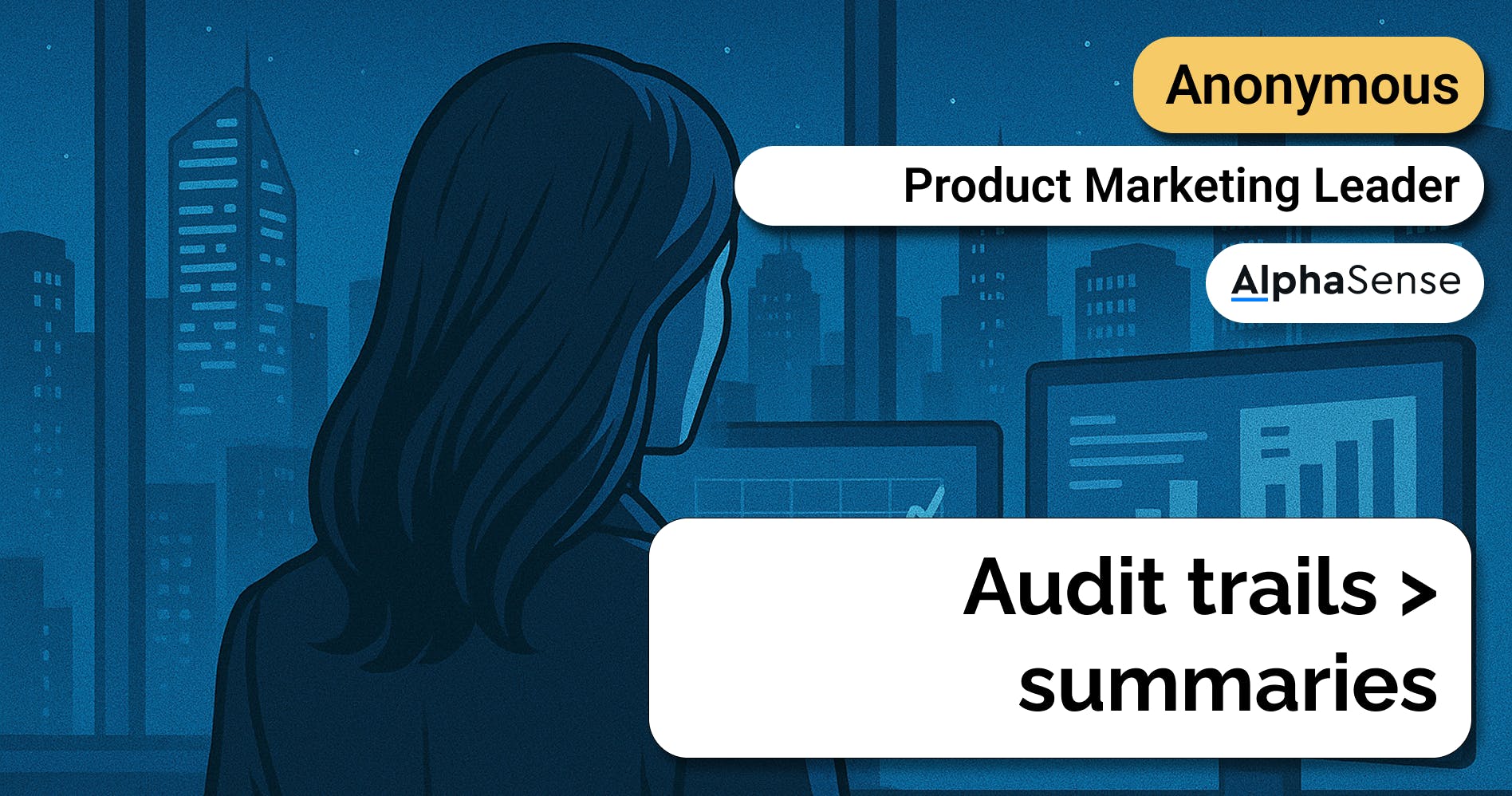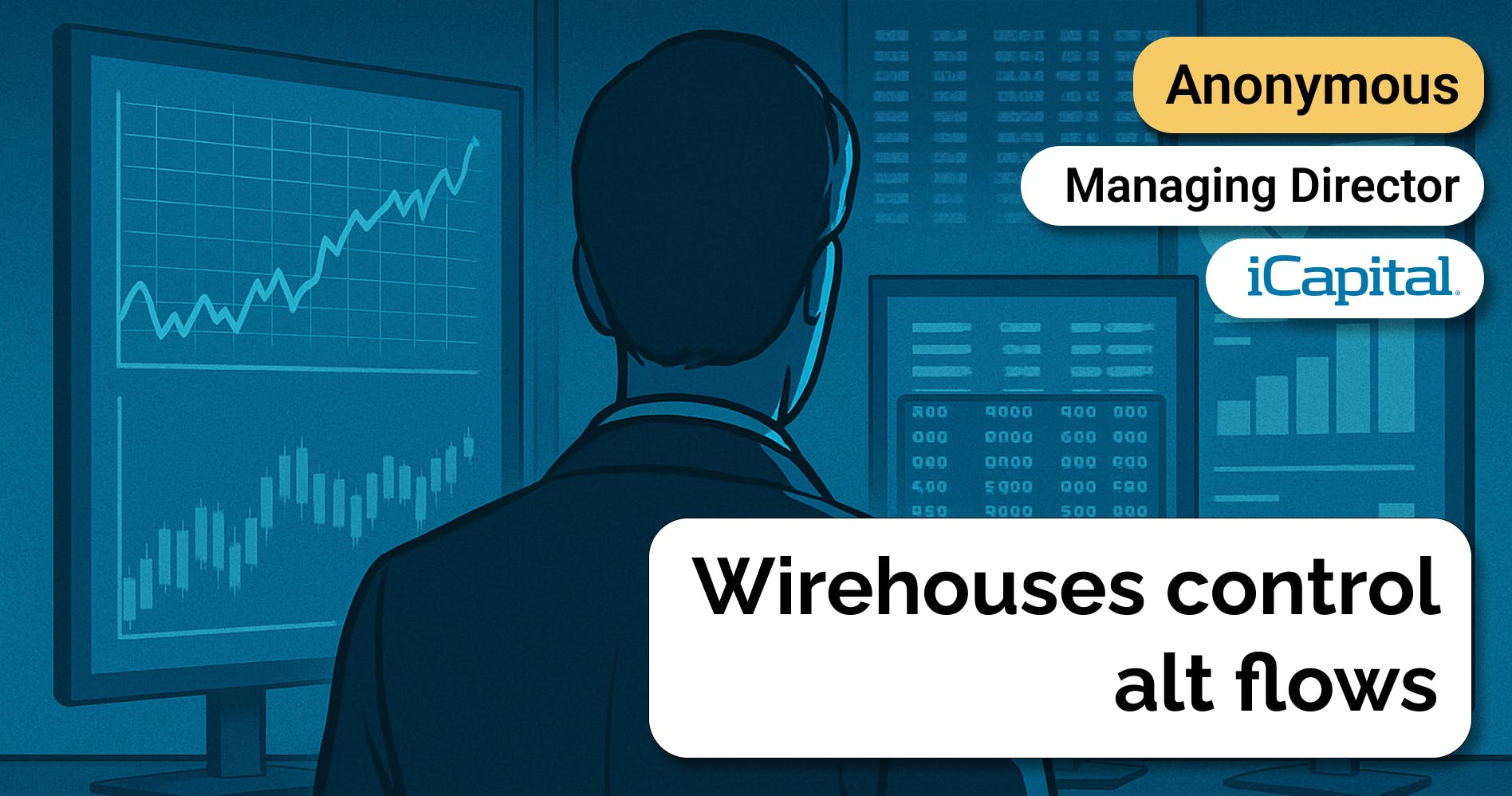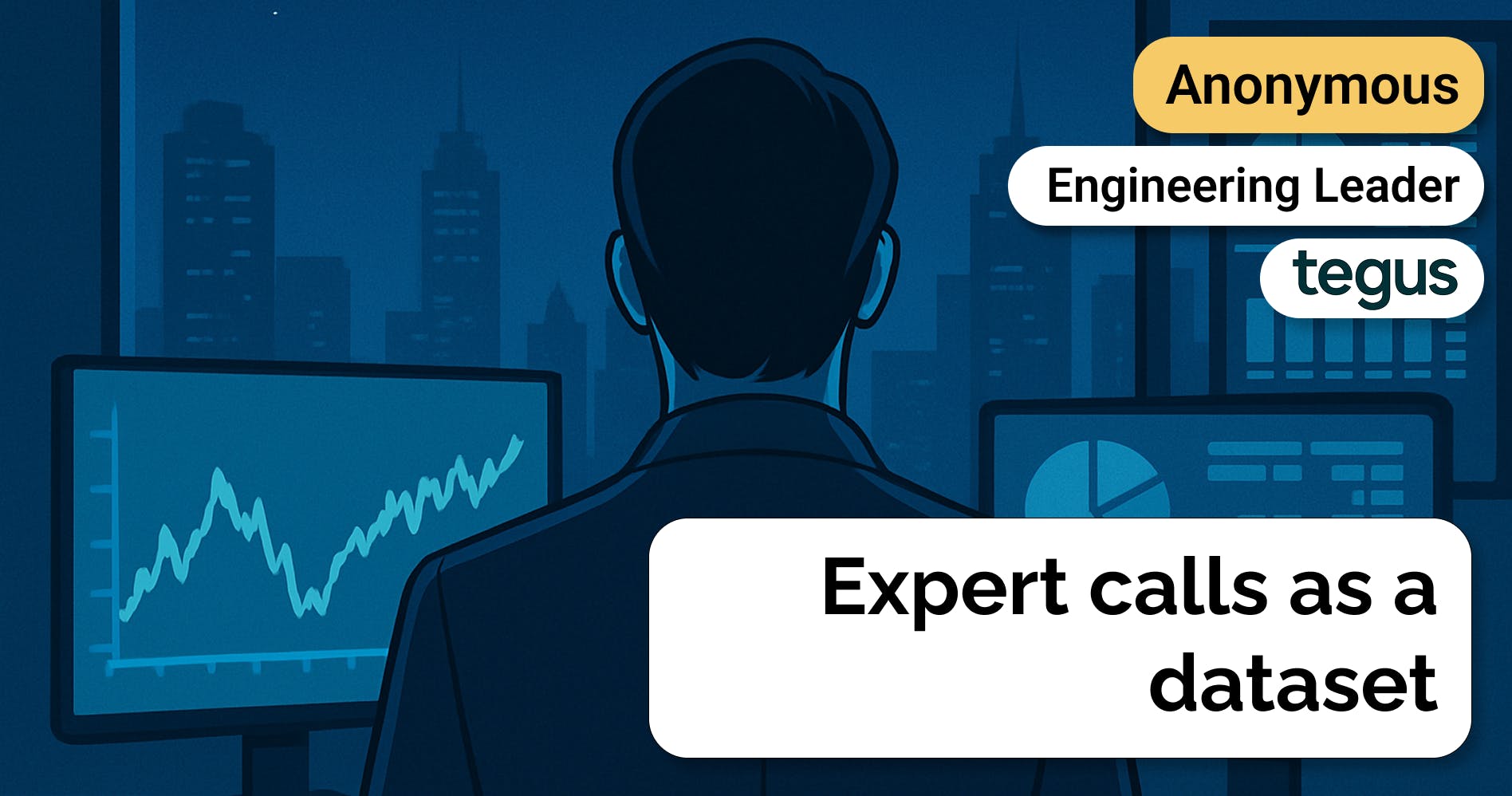Product Marketing Leader at AlphaSense on building the Google for financial services
 Jan-Erik Asplund
Jan-Erik Asplund

Questions
- What are the main kinds of clients and customer segments and how do their needs overlap or diverge?
- Is it fair to say that AlphaSense is really more focused on that public market investor? The naive view is AlphaSense is more focused on your big public markets investor. They're getting into private markets, selling into corporates, but that's still their bread and butter. Do you think that's a fair view?
- What do you think are the sticky products for them? Typically in a platform, from a usage and even a sales retention perspective, there's really two or three banner products that a company really banks on.
- What is it about the search product that makes it so effective and delivers so much value for customers? Enterprise search is something that a lot of people try to do well and very few do.
- You mentioned stuff that's not in the public domain per se. Are you referring to data that people bring to AlphaSense?
- Where do you think the remaining opportunities are in AI for a company like AlphaSense? They started early, so one might think they've squeezed that orange. What's left for them to do in AI?
- What other priorities do you think are top of mind in terms of where they need to take the product to maintain defensibility and maintain an edge in their space?
- Can you outline for me and map where you see the competition for AlphaSense?
- What about workflow automation? I've heard companies like Hebbia say they're not just about finding and synthesizing information, but also the platform where you do your work. Does AlphaSense think about it the same way?
- What would push a private markets focused investor to choose AlphaSense versus PitchBook, for example?
- How did AlphaSense think about the inherent opacity of private markets? How did it deal with that problem in terms of fielding a product and features and data that's relevant to private market investors?
- What would you say to someone that's very skeptical that that engine is inherently scalable? At the end of the day, it's a human talking in real time.
- I'm curious about pricing. In the case of CB Insights, at one point we found that we could sell 4x or 5x more larger deals to corporates versus VC or private market investors. Is that the case for AlphaSense in terms of increased ACVs?
- In terms of average contract value, we've heard that maybe a typical contract is like $40K. Are we totally off, or does that sound about right?
- In terms of going to corporates or financial service companies and saying "give us your data and we'll help you get more value out of it," I can imagine what some of the common objections might be. How do you meet those objections?
- I imagine with Enterprise Intelligence, there's a ceiling where larger organizations are going to want to build something themselves. You think there's anything to that idea that this is probably for the mid-market, smaller corporate, the smaller investor?
- What do you think, based on AlphaSense's trajectory—is this a company that could grow through acquisitions? They introduced Enterprise Intelligence, it sounds like they built a lot of that internally. What is the path forward for AlphaSense? Is it build, buy, partner?
- Do you have examples? What would be a representative example of something that could happen that illustrates a partnership at the macro or vertical level?
- Help me understand how AlphaSense becomes better at serving companies in an AI world where it's supplying Enterprise Intelligence but it can't use that data to improve the product and experience for other customers. The proprietary data stays siloed. The flywheel breaks down, basically. What am I getting wrong with that story?
- Do you think there is a natural evolution towards a transaction point for a product like AlphaSense?
- What are the risks for AlphaSense? You mentioned one earlier about stemming from the Google and Microsoft ecosystems. What other risks or threats do you see around the corner?
- In terms of Enterprise Intelligence, is that something that is usually sold to new customers, or is that more something that you try to get people to do once they come in the door?
- What is the mix of partnerships for data versus just datasets that AlphaSense acquires from the ground up?
Interview
What are the main kinds of clients and customer segments and how do their needs overlap or diverge?
There are two main verticals at the highest level. There is financial services, and then there is corporate clients. At that level, people are fundamentally trying to make decisions about where to invest, where to allocate their capital, which areas to do R&D in, etcetera.
So very high level: financial services, corporate. At the next level down on financial services, you have two different main classifications. You have private market investments and public market investments.
Obviously, then we're getting into different categories of organizations that make those investments. But again, they're largely trying to make strategic capital investment decisions either in private or public markets.
Is it fair to say that AlphaSense is really more focused on that public market investor? The naive view is AlphaSense is more focused on your big public markets investor. They're getting into private markets, selling into corporates, but that's still their bread and butter. Do you think that's a fair view?
I think that's a fair view, but you have to take a step back and think about the problem that AlphaSense is trying to solve. It's trying to be the place where you go to make any decision in terms of allocating capital, whether that be private or public. So I think that description you gave is true today, but I don't think it has ambitions for that necessarily to be as true tomorrow.
What do you think are the sticky products for them? Typically in a platform, from a usage and even a sales retention perspective, there's really two or three banner products that a company really banks on.
Within the investment community, there are client profiles that are well served by the Wall Street brokerage houses of the world. They have a lot of access to all of those Wall Street reports. And then there are clients within financial services who maybe don't have as easy access or it's not as streamlined or cost effective. That's true for corporates, but it's also true partly for some of those investment professionals as well.
Wall Street Insights product has been a big game changer for AlphaSense and its trajectory. In 2024, they purchased Tegus, and they did that because expert transcripts are a huge differentiator and often important both in a public company, but also in a private company, increasingly so in a private company context as well.
I'd say they're the two outstanding, but really, AlphaSense's bread and butter—and I don't necessarily prescribe to this, but I do think it's a good way to describe what gets people jazzed about AlphaSense—is they're almost like the Google for financial services. It's that idea of being able to hone in on the specific sentences, not just the content source, but the specific sentences and the paragraphs that makes their search really powerful. It's the combination of the content and the search that is the sticky part.
What is it about the search product that makes it so effective and delivers so much value for customers? Enterprise search is something that a lot of people try to do well and very few do.
It's an interesting moat in terms of whether it truly exists anymore, but I think the advantage that AlphaSense has even with generative AI is the way that they built their AI stack back in the day before ChatGPT was even a thing and helped lots of people probably follow suit. They built it on a bedrock of human-in-the-loop synonyms, and they were very deliberate with spending years and years building that library. The way that they have ingested and parsed out all of these documents at the granular character level is what sets them apart.
They have this fabulous intake process for content that's literally parsing everything at the character level. On that bedrock, when you think about the value that access to content now has, especially if it's not in the public domain, that's still giving them some kind of technological moat.
You mentioned stuff that's not in the public domain per se. Are you referring to data that people bring to AlphaSense?
Increasingly now with Enterprise Intelligence—that's been the genius move that they made before the world was really ready or thinking about it necessarily. They have gone from just this idea of a cloud SaaS platform to now the ability to ingest the whole of the organization's data. It's this merging of "we're coming with content that we know you already want, we know you're sitting on huge volumes of content, and we're going to bring it together into an environment where we can layer on our search technology." It's been pretty genius.
Where do you think the remaining opportunities are in AI for a company like AlphaSense? They started early, so one might think they've squeezed that orange. What's left for them to do in AI?
There's always that utopian perspective or goal where somebody's like, "I don't want you to give me bullet points or tell me basically how this particular white space might exist. What I really want you to do is assess the context of: here's our portfolio, here's how much money belongs in the portfolio. Where at any one time should we be allocating that? Just tell me where we should be allocating it."
Instead of giving me information to make a decision, almost make the decision for me. That feels like if AlphaSense doesn't do it, somebody's going to get there, and it's going to be because that's just about character limits and enough context. Somebody will get there. That's probably the Rubicon that AlphaSense needs to decide whether they cross or not, because somebody will.
What other priorities do you think are top of mind in terms of where they need to take the product to maintain defensibility and maintain an edge in their space?
With the move to Enterprise Intelligence, it's one thing building AI that can parse known content sets. But if you're going to start bleeding into almost knowledge management AI, like the Elastics of the world, you've raised the game in terms of the capabilities of your AI and the expectations across.
I haven't worked at AlphaSense—I left in January. The speed with which things are being developed, I don't know if that's still a concern for them or not, but it was certainly a hot topic because I was in charge of competitive intelligence. As we thought about that aspect, that was a huge thing at the time as you would expect.
Can you outline for me and map where you see the competition for AlphaSense?
AlphaSense is trying to be the place where you go for all decisions regardless of whether you're private or public markets. That's a pretty big competitive set right there.
On one side, you think of the Bloombergs, although obviously there's a whole host of quantitative datasets that Bloomberg has and quite frankly, institutional entrenchment with their terminals that AlphaSense would have a hard time overcoming. But after Bloomberg, you've got people like S&P Cap IQ, you've got the FactSets of the world. Then on the private market side, you've got the PitchBooks. You've got, to some extent, yourselves.
There are those areas, and then there were some companies that feel less about decision making and more about the back end of financial services and providing access to alternative investments versus actually fundamentally making the decision of where to allocate that capital. We didn't tend to include those types of competitors. It was more around the content spaces and the different applications of those content spaces.
What about workflow automation? I've heard companies like Hebbia say they're not just about finding and synthesizing information, but also the platform where you do your work. Does AlphaSense think about it the same way?
Traditionally at AlphaSense, it was more about being in the presentation layer than deeply integrating into the various workflows. The move to Enterprise Intelligence could be construed also as a move into more workflow—it will eventually lead to more workflow. I know there's been a lot of development around features that are akin to some of the things you can do in Hebbia, for example.
But the focus has been on access to content and finding the information because that strategy is a strong strategy—it always feels like you can never reach the end goal with that strategy. Yet if you can make things easy enough through APIs to extend into workflows at the end, especially at the Enterprise Intelligence level, there's often developer teams already. There's often APIs in the mix. So I'm not sure if it would ever make sense for AlphaSense to go deep into the workflow aspect in the same way.
What would push a private markets focused investor to choose AlphaSense versus PitchBook, for example?
When we think about AlphaSense versus PitchBook, it depends on the type of investments you're making. A lot of times, it's the strength of the content, the relative content libraries. If that's the case and you're trying to judge, then oftentimes there's an inevitable bake-off where you'll have access to both, and you're literally sitting down and seeing what you can get from each. You're basing the decision largely on access to content.
That's really how it was largely decided, and I can't imagine that has changed. The other thing that's interesting is where AlphaSense would be the clear front-runner is if there were organizations that did both public and private clearly. Then that's a strong indicator that AlphaSense is a really good match.
Sometimes it wouldn't be unheard of for people to have access to multiple sources of information. Sometimes the two coexisted as well. It wasn't necessarily always one or the other. Sometimes the answer was both.
How did AlphaSense think about the inherent opacity of private markets? How did it deal with that problem in terms of fielding a product and features and data that's relevant to private market investors?
AlphaSense generally has a very large web scraping initiative. There is definitely an element of "we're going to ingest a lot of information in the public domain and make that available." Because again, the idea is to drive efficiency. AlphaSense really wants everything to sit alongside each other—what's in the public domain and what isn't in the public domain. There's definitely a lot of web scraping similar to PitchBook and other companies.
But one of the big things—and one of the reasons that the Tegus acquisition has been amazing—is because AlphaSense is making a bet on the value of those expert transcripts, but not only the value of the output, but with Tegus specifically, the efficiency of the model with which they collect that output. It's a huge engine that has been scaled, that AlphaSense is helping to scale even further with their access to capital and funding. The bet that AlphaSense is making is that that transcript library will help provide up-to-date fresh information on the private markets alongside some of that publicly scraped information.
What would you say to someone that's very skeptical that that engine is inherently scalable? At the end of the day, it's a human talking in real time.
That's a fair point, but it's all relative to the competition in some ways because if I'm ultimately assessing platforms, it's about who has the right content for me. At that level, if AlphaSense can keep growing and build up their private company information, and as a prospect, I find the information I need or it's better than anywhere else—not even just in the US, but on a global perspective—it matters less about the limits and more about if I can scale it in a way that is meaningful to who I'm going after versus other people.
The other thing that's interesting—I work for a consumer research platform now, and actually, my day job is building AI moderation. I think about AI being the moderator and the scalability in that process as a potential solution.
I'm curious about pricing. In the case of CB Insights, at one point we found that we could sell 4x or 5x more larger deals to corporates versus VC or private market investors. Is that the case for AlphaSense in terms of increased ACVs?
I think so. Corporates have somewhat been underserved with a lot of information around companies from a financial and performance perspective. So there was absolutely a need. Back to the Wall Street Insights—providing broker reports was the breakthrough that opened up the corporate market.
There's definitely a difference. What's helped is the move to Enterprise Intelligence. For certain clients, maybe less so if you're just private markets on your own, but even then, there's an enormous amount of internal intelligence and content that you need to parse and sift through.
The move to Enterprise Intelligence has really driven—you have it on your summary of AlphaSense, how the average contract value has increased. That's a big reason for why that is happening, and that's happening across financial services and corporates where clients are underserved by various datasets and content types and are sitting on a wealth of internal content. They've also realized that it's maybe better to invest in an off-the-shelf platform than have an in-house team that is constantly trying to update models and refine prompts. That's where a lot of that growth is coming from.
In terms of average contract value, we've heard that maybe a typical contract is like $40K. Are we totally off, or does that sound about right?
The numbers you had on your website from what I knew are around about the right figures [ $10,000-$20,000 per seat annually with ACVs ranging from $50K to $100K+ for enterprises, with larger customers paying over $1M]. Again, it's been increasing, but they're around about the right values.
In terms of going to corporates or financial service companies and saying "give us your data and we'll help you get more value out of it," I can imagine what some of the common objections might be. How do you meet those objections?
Just from a strategic perspective, this is where AlphaSense—not just AlphaSense, but a lot of companies—have been smart in offering, "Actually, we're going to offer you on-prem so it can be behind your firewall, and we'll just give you access to our content and tech behind your firewall so we don't even get that back."
Or, "We have protection layers and this is how we're handling your data and the security of your information." Having the option for people to have it behind their firewall in their own backyard is incredibly smart because you're right—some orgs won't ever be persuaded, but that's why they did that. They offered those on-prem services and even on the cloud behind your firewall.
They've been incredibly smart in overcoming some of those inevitable objections. It's just standard technology objections when you get to that level. They've just been diligent and smart in planning for that and almost expecting it. TLDR, it's nothing fancy. It's just very sensible risk mitigation from an AlphaSense perspective in how they thought about the offering.
I imagine with Enterprise Intelligence, there's a ceiling where larger organizations are going to want to build something themselves. You think there's anything to that idea that this is probably for the mid-market, smaller corporate, the smaller investor?
There's a weird paradigm that happens when you are a large company with big resources. Ironically, with the advent of AI, it's both made things incredibly easy for people to develop, but it's also meant that some of those big companies are under pressure to release some of their workforce and become more efficient generally in how they spend their money.
There's probably a group of large organizations that really take the challenge of organizing their internal enterprise level data and then building the search technology on top themselves. And there is probably the vast majority of companies that maybe think about it even at the largest scale, but then don't follow through for various reasons.
The smart thing about companies like AlphaSense is that even if you build it, there's still an argument for leveraging the AlphaSense API to then not have to manage the upkeep of the prompting and the LLM and the models and everything behind the scenes.
The real risk for AlphaSense comes from the fact that a lot of those big organizations are Google shops or Microsoft shops. When you're at that level, your information is stored in those infrastructures. Is it a matter of time before the value in some of these things that AlphaSense and others might offer becomes less because the Googles and the Microsofts have figured out how to build these search engines with this data? You get into a whole realm of competition that people don't necessarily think about, but that's probably the worry—those huge enterprise storage places and what they will do and be able to do.
What do you think, based on AlphaSense's trajectory—is this a company that could grow through acquisitions? They introduced Enterprise Intelligence, it sounds like they built a lot of that internally. What is the path forward for AlphaSense? Is it build, buy, partner?
That's a great question. AlphaSense has a lot of options open to it. Jack Kokko is a very shrewd operator. Traditionally, AlphaSense has done the build or buy/acquire pathway.
One of the exciting things about AlphaSense is they haven't tapped into the partner aspect a lot. It always feels like when companies get to a certain size, that's the next lever for continuing to grow. I'm excited for the prospect of AlphaSense doing that, because there are some huge players that they could potentially explore partnering with so that you remove some of these existential risks from the likes of Google and Microsoft and all their storage capabilities. There are tangential partners that could be of massive service to them.
Those partnerships exist at the overall macro level for AlphaSense, but also in each of the specific verticals, the types of clients and industries that they serve. The partnership one is something that I would love to see them make headway on, and possibly that's something for the future.
Do you have examples? What would be a representative example of something that could happen that illustrates a partnership at the macro or vertical level?
A simple one at the macro level might be: you're telling me where to allocate my capital. Now, I'm able to click through to your partner and actually allocate that capital. If I think of a multiple agent system, one of the agents is AlphaSense and another agent is a partner that actually allocates the capital. That's very much at the macro level.
Maybe an example at the vertical level—if I'm a competitive intelligence analyst and I'm exploring competitors, and ultimately what I want to do is make sure that my sales team has that information and is trained, well, maybe I partner with a Highspot or a Guru so that that knowledge is then transferred from AlphaSense to the sales team. Those partnership opportunities exist.
Help me understand how AlphaSense becomes better at serving companies in an AI world where it's supplying Enterprise Intelligence but it can't use that data to improve the product and experience for other customers. The proprietary data stays siloed. The flywheel breaks down, basically. What am I getting wrong with that story?
That makes sense, and honestly, I don't really have the answer. What I would say is that I work at a company where we have enterprise access to OpenAI ChatGPT. What I expect is happening is while they're not using our proprietary data and they're not training their models specifically on my queries and their data, there's probably a level of metadata that is being used on some level that at least tells them how successful their model is on some level—on a very high level. Not that they're able to see what we're searching or how we're using the tool, but are we using the tool? Is it being used? There are ways to infer and gauge how well a tool is being used without actually training the model on your data. Maybe there's more nuance there than the statement that I read every day when I log into my ChatGPT interface. There's probably a few levels deeper in the SOW or the legal agreements.
Do you think there is a natural evolution towards a transaction point for a product like AlphaSense?
I think it's a phenomenon that is happening in the world at large. We are entering into a space where there will be multiple AI agents that are semi or fully autonomous. In that world—and again, this isn't just AlphaSense, this is across the board—we are definitely moving into a space where there are multiple agents, and they're all specialists in doing various things with a range of autonomy, humans in or out of the loop.
Very much back to your earlier question about workflows, that's how AlphaSense will play a role in workflows—it will be an agent in a larger thread that is responsible for a particular task, and then other agents will carry out those tasks. That is the way that business will get done, and architecture and IT infrastructure will exist. I hope they're thinking about it, because if they're not, they should be. If they're not, hopefully they can credit this anonymous interview with the answer.
What are the risks for AlphaSense? You mentioned one earlier about stemming from the Google and Microsoft ecosystems. What other risks or threats do you see around the corner?
There's always the risk of operational/executional risk—they fail to execute and continue to scale. There's inherent risk for all startups and pre-IPO companies and quite frankly, even public companies.
But the other risk would be they don't think about what we just talked about. They don't think about and plan for a future where it's multiple agents stacked on top of each other, and somebody else does. There are strategic risks. But again, tell me a company that that doesn't exist for. There's nothing inherently unique to AlphaSense that I believe is a risk that isn't also a risk for every single company on the planet.
In terms of Enterprise Intelligence, is that something that is usually sold to new customers, or is that more something that you try to get people to do once they come in the door?
I'm not sure the exact strategy around it. It would make sense, and I wouldn't be surprised if the strategy focused on getting people through the door with the regular SaaS platform and then growing them into Enterprise Intelligence. They're shrewd enough to understand that. That probably is the pathway.
What is the mix of partnerships for data versus just datasets that AlphaSense acquires from the ground up?
If I look at the trajectory of AlphaSense, it's gone from almost exclusively external data partners where they're partnering with each of the broker firms—and there's inherent risk there because you don't own the data and you're relying on the partnership—to definitely moving to the other side, which is we own and control this data, this content. I couldn't give you an exact figure, but the pendulum has definitely swung. Jack is incredibly savvy, and he well knows those risks. They have been planning for that from the start, basically.
Disclaimers
This transcript is for information purposes only and does not constitute advice of any type or trade recommendation and should not form the basis of any investment decision. Sacra accepts no liability for the transcript or for any errors, omissions or inaccuracies in respect of it. The views of the experts expressed in the transcript are those of the experts and they are not endorsed by, nor do they represent the opinion of Sacra. Sacra reserves all copyright, intellectual property rights in the transcript. Any modification, copying, displaying, distributing, transmitting, publishing, licensing, creating derivative works from, or selling any transcript is strictly prohibited.











